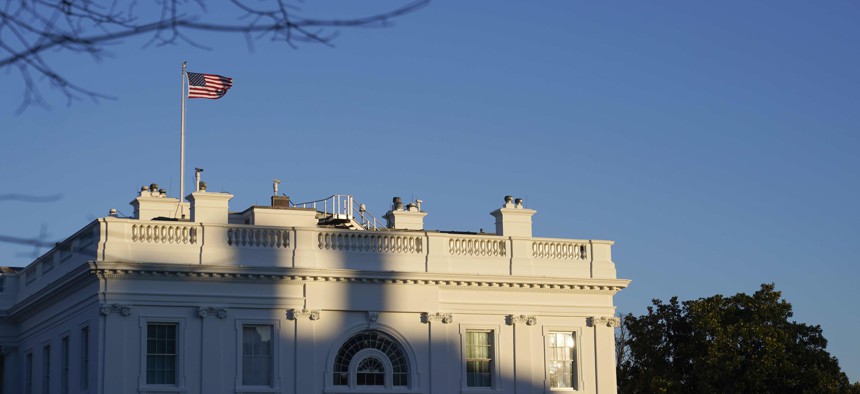For Mayors, Biden Administration Marks End to a Turbulent Era

The setting sun falls on the White House in Washington, Saturday, Jan. 23, 2021. AP Photo/Patrick Semansky

Connecting state and local government leaders
Mayors are embarking on a new, more upbeat, relationship with the White House after four often contentious years.
Back in January 2018, about a year into Donald Trump’s presidential term, dozens of mayors, gathered in Washington, D.C. at the start of their annual winter meeting, were blindsided by a Justice Department announcement threatening legal action against about 20 states and localities over immigration enforcement.
A press conference where the mayors planned to talk about the need for infrastructure investment was instead overshadowed by the news out of DOJ. The events that day reflected the tension and combativeness that came to define the White House’s relationship with some of the nation’s largest cities, and their mayors, during Trump’s tenure.
“We would go about and do our things and then hopefully the federal government would do no harm to what we were doing,” said Louisville, Kentucky Mayor Greg Fischer, the current president of the U.S. Conference of Mayors. “It was obviously very contentious at times.”
But with President Biden’s inauguration on Jan. 20, this dynamic took a sharp turn.
“It’s like going from an acrimonious relationship where you were not involved or appreciated to one that’s more of a high-performance relationship where everybody’s at the table and it’s the best ideas that are important, it doesn’t matter where they come from,” Fischer told Route Fifty last week. He spoke as the mayors’ conference held its latest winter meeting—online because of the coronavirus.
“It just takes out the negative energy,” he added. “It’s very refreshing."
When Trump took office in 2017, some of his administration’s earliest priorities put him quickly at odds with mayors and other local leaders. He proposed a budget that slashed—or took a “meat ax” to, as one official put it—grants and other programs cities depend on.
There were the brush-ups and court fights between the administration and local governments that involved immigration and so-called “sanctuary city” policies.
And Trump, a New York City native, repeatedly railed against cities as ominous, crime-ridden places, run by Democrats who didn’t share the same values as his core supporters. “A disgusting, rat and rodent infested mess” and a “very dangerous & filthy place,” he tweeted about parts of Baltimore in 2019, as he lashed out at one of his critics in Congress.
The promise of an infrastructure package dangled, alluringly, for city leaders as an area where they might’ve struck common ground with the Trump White House. But it never came to be.
Then this past year, with states and localities in the thick of the pandemic, the Trump administration sought to label certain cities where protests over police brutality were taking place as “anarchist jurisdictions,” and threatened to withhold federal grant money from them.
The move was reminiscent of the earlier sparring over immigration and a reminder of the former president’s appetite for conflict, rather than cooperation with Democratic-led cities—even at a time when they were dealing with a historic disease outbreak, an economic downturn and unrest brought on by a national reckoning over racial justice.
It’s these sorts of episodes that many of the nation’s mayors are now eager and relieved to leave behind as Biden’s term gets underway.

The pandemic, which has left over 400,000 Americans dead, badly damaged parts of the economy and strained many cities’ finances, means that the new administration and mayors are not embarking down an easy path as they try to work together.
But Biden did send a strong signal of support for local leaders when, as part of the coronavirus recovery plan he unveiled this month, he called for $350 billion to help state, local and territorial governments. Securing aid like this has been a major priority for local governments, especially smaller ones that didn’t receive direct relief from earlier packages.
Whether the president’s aid plan can win approval in Congress is still unclear, even with Democrats now holding a narrow majority on Capitol Hill.
In the meantime, lines of communication are open between mayors and the new administration. “We were one of the first groups that he met with back in November so we could share our challenges,” Fischer said. The Conference of Mayors for its part has served as a consolidated, nonpartisan voice for its members as they interact with the White House, he added.
“It’s been like a team, from day one,” he said of the mayors’ work with the Biden administration. “No drama.” Fischer went on to say that White House intergovernmental affairs chief Julie Chavez Rodriguez has done a “fabulous job” so far working with the Conference.
Biden also tapped two people with mayoral credentials for cabinet level posts—Pete Buttigieg of South Bend, Indiana as Transportation Secretary and Boston’s Marty Walsh as Labor Secretary. Fischer said they’ll provide potential connections between the new administration and local leaders and would also be able to bring a city official’s perspective to their new federal jobs.
The pandemic and securing the additional federal aid are top-line priorities for the Conference currently. But the group also wants to work with the Biden administration on racial equity and climate policy, Fischer said. Many cities are facing gun violence problems as well, he added.
“Mayors have been in the trenches on all of these issues and we’re really glad to see the help coming from the federal government,” Fischer said. “It’s been a real change and it’s been great.”
Bill Lucia is a senior reporter for Route Fifty and is based in Olympia, Washington.

NEXT STORY: HUD Nominee Wants to Ensure Housing Crisis Doesn’t Worsen During Pandemic





